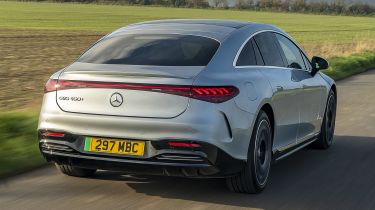Mercedes EQS review: running costs & insurance
Mercedes' EV flagship is expensive, and pricey to insure as a result, but servicing and company-car tax costs are as low as for any electric car
| Insurance group | Warranty | Service interval | Annual company-car tax cost (20%/40%) |
|---|---|---|---|
| 50 | 3yrs/unlimited miles | 1yr/15,000 miles | From £422/£844 |
The Mercedes EQS is an expensive electric car to buy, and therefore quite expensive to insure, too. But like all zero-emissions vehicles, it has a very low Benefit-in-Kind (BiK) company-car tax of 2% until at least April 2024 – potentially saving you thousands versus an equivalent petrol or diesel-powered Mercedes S-Class or similar. The annual bill for running the entry-level EQS model as a company car is just £422 or £844 a year respectively for a 20% or 40% taxpayer – though it’s reasonable to expect those lucky enough to be running either an EQS or AMG EQS are likely to fall into the latter of those two brackets.
Mercedes EQS insurance group
Unsurprisingly for an expensive electric luxury car, the Mercedes EQS falls into the highest insurance group there is: 50. Although the same is true for all of the EQS’ rivals from Audi, BMW and Porsche.
Warranty
Every member of Mercedes’ EQ range of electric cars is covered by a three-year/unlimited-mileage warranty, which is the same level of coverage you get on a BMW iX. Although the Tesla Model S does get a longer four-year warranty, it has a relatively low mileage limit of 50,000. Meanwhile the EQS’ batteries are warrantied for eight years or 160,000 kilometres (which is just under 100,000 miles).
Servicing
The Mercedes EQS follows a similar service schedule to Merc’s other electric models like the EQC, which requires a service every year or 15,000 miles, whichever comes first.
Road tax
As the Mercedes EQS doesn’t emit any CO2, it’s zero-rated for road tax (VED) until 2025 and attracts an extremely low Benefit-in-Kind (BiK) company-car tax rate of just 2% until at least April 2024. Its zero-emissions status also sees it escape the London Congestion Charge and other emission-controlled clean-air zones until 2025, too.
Depreciation
It’s fair to say that if you’re looking to buy an electric luxury car, you should prepare to lose a lot of money in depreciation. For example, while the Mercedes EQS will hold onto anything between 51-54% of its value over three years and 36,000 miles, its circa-£100,000 starting price must mean owners will have to swallow a roughly £50k loss in that time. This is the same case for the BMW i7, however, which is officially rated to retain slightly less of its initial value over the same period.

